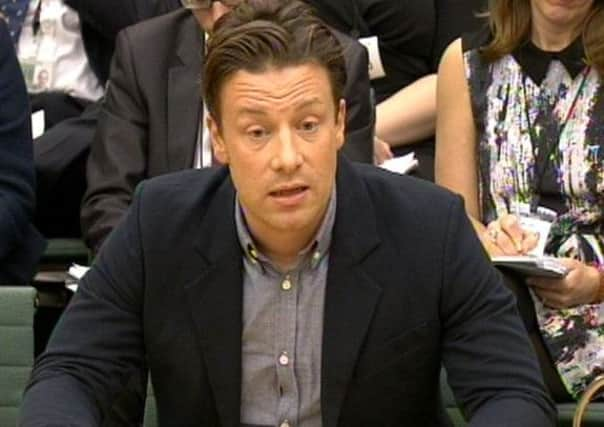How the ‘sugar tax’ is putting Yorkshire MPs on a collision course with Jamie Oliver


HAVING gone to war over turkey twizzlers, celebrity chef Jamie Oliver is now heading the fight to wean the nation’s children off sugary drinks – but his intervention is not going down well with Yorkshire MPs.
“Patronising nonsense,” said Andrew Percy, the Conservative MP for Brigg and Goole, of Oliver’s calls for a “sugar tax” on soft drinks.
Advertisement
Hide AdAdvertisement
Hide Ad“This is a classic nanny state reaction and it won’t work. Slapping 10p or 20p on a can of sugary drink won’t make people change their behaviour.”
Ironically, Mr Percy is a member of the cross-party House of Commons Health Committee, which yesterday recommended the Government impose just such a tax.
But he’s not the only one unhappy with the committee’s final report.
His colleague and fellow committee member Andrea Jenkyns told The Yorkshire Post she also harbours doubts as to how effective a levy on soft drinks would prove.
Advertisement
Hide AdAdvertisement
Hide AdBut why has this issue suddenly become such a political hot potato?
Quite simply, it’s down to the Jamie Oliver Effect.
The TV chef examined the impact of sugar in children’s diets in a Channel 4 documentary in August. He has since come up with his own six-point plan of action which he has sent to David Cameron.
His recommendations include a tax of seven pence on cans of soft drinks, the labelling of products to show how many teaspoons of sugar they contain and a compulsory reformulation of food and drink to make it healthier.
Urging the Government to put the issue at the top of their agenda, he said: “It is absolutely clear that the time for dithering about the future health of our nation is long gone.”
And the statistics show he’s got a point.
Advertisement
Hide AdAdvertisement
Hide AdOne in five children are now overweight or obese when they begin school, rising to one in three by the time they leave primary school. Their sugar intake – on average three times recommended levels – is a key factor.
Given that treating obesity costs the NHS £5bn a year and is one of the risk factors for type 2 diabetes which swallows up a further £9bn – or nearly 10 per cent of the NHS budget – isn’t there a need for the “bold and urgent action” that the Health Select Committee is calling for?
“I can understand in principle,” said Ms Jenkyns, who represents the Morley and Outwood constituency in West Yorkshire, “but I’m not convinced that a tax, especially so early on, is the answer.
“A quarter of children are obese by Year 6 and most of them live in deprived areas, so you would be hitting poorer families in the pocket, which is the last thing we want to do.”
Advertisement
Hide AdAdvertisement
Hide AdShe believes education and better labelling should be the starting point. “Let’s get everybody on board and exhaust these areas first,” she said. “A sugar tax should be a last resort.”
Mr Oliver was back at the House of Commons yesterday for a Westminster Hall debate triggered by his own online petition which has so far attracted more than 150,000 signatures.
But is the chef’s intervention helpful?
“It raises the point that we do consume far more sugar than we should,” conceded Ms Jenkyns. “However it’s very easy to tax people but really it’s about educating them.”
A “proper debate” about the issue, she said, would be better than “going with the populist thing because a celebrity says it”, adding: “I don’t want it to become a nanny state.”
Advertisement
Hide AdAdvertisement
Hide AdDavid Cameron has previously opposed a sugar tax, but the Health Committee report will heap further pressure on him to take action – especially with Jamie Oliver involved.
Meanwhile, many will be wondering why parents simply can’t say no when little Johnny demands a can of fizzy pop or chocolate bar.